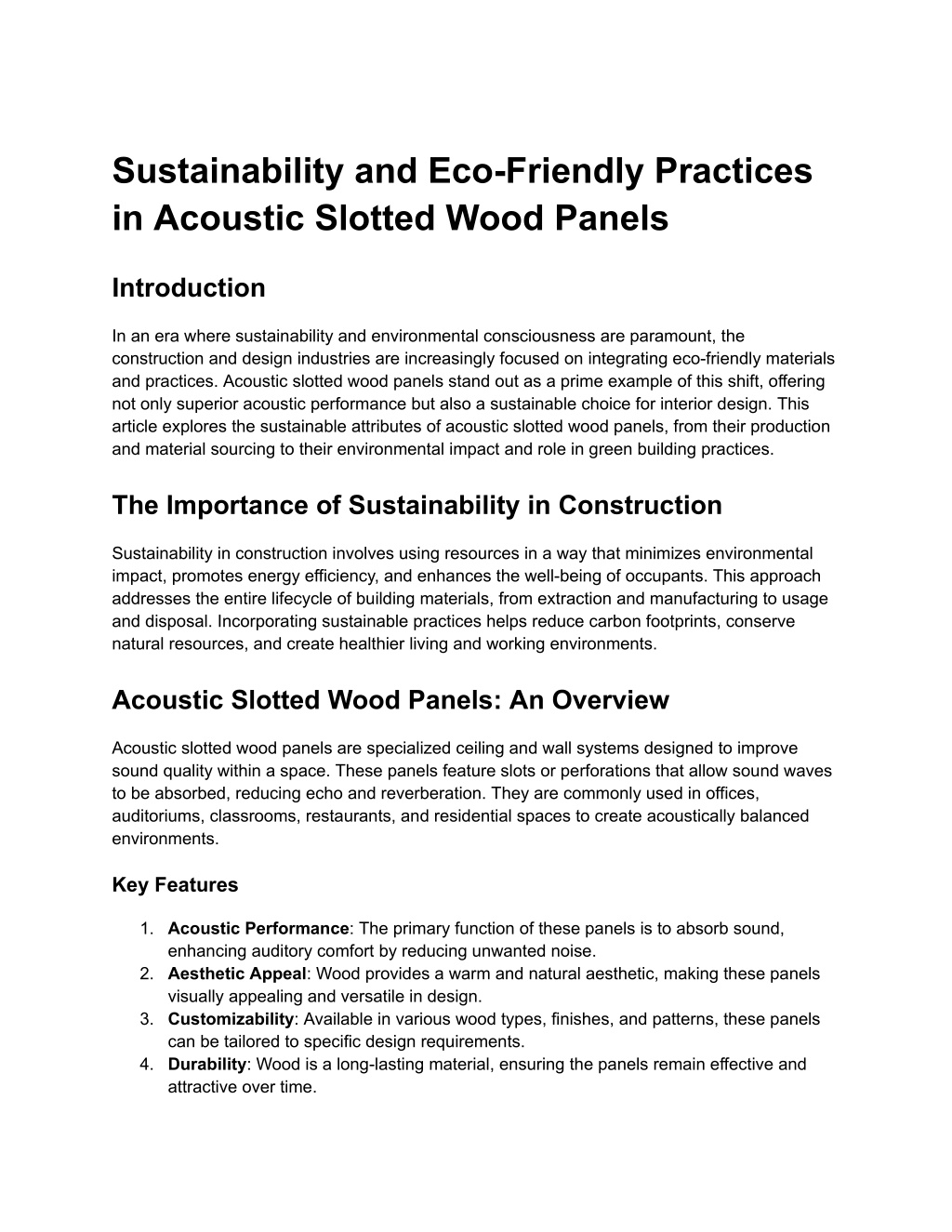
Sustainability and Eco-Friendly Practices in Acoustic Slotted Wood Panels
In an era where sustainability and environmental consciousness are paramount, the construction and design industries are increasingly focused on integrating eco-friendly materials and practices. Acoustic slotted wood panels stand out as a prime example of this shift, offering not only superior acoustic performance but also a sustainable choice for interior design. This article explores the sustainable attributes of acoustic slotted wood panels, from their production and material sourcing to their environmental impact and role in green building practices.n
Download Presentation
Please find below an Image/Link to download the presentation.
The content on the website is provided AS IS for your information and personal use only. It may not be sold, licensed, or shared on other websites without obtaining consent from the author. Download presentation by click this link. If you encounter any issues during the download, it is possible that the publisher has removed the file from their server.
Presentation Transcript
Sustainability and Eco-Friendly Practices in Acoustic Slotted Wood Panels Introduction In an era where sustainability and environmental consciousness are paramount, the construction and design industries are increasingly focused on integrating eco-friendly materials and practices. Acoustic slotted wood panels stand out as a prime example of this shift, offering not only superior acoustic performance but also a sustainable choice for interior design. This article explores the sustainable attributes of acoustic slotted wood panels, from their production and material sourcing to their environmental impact and role in green building practices. The Importance of Sustainability in Construction Sustainability in construction involves using resources in a way that minimizes environmental impact, promotes energy efficiency, and enhances the well-being of occupants. This approach addresses the entire lifecycle of building materials, from extraction and manufacturing to usage and disposal. Incorporating sustainable practices helps reduce carbon footprints, conserve natural resources, and create healthier living and working environments. Acoustic Slotted Wood Panels: An Overview Acoustic slotted wood panels are specialized ceiling and wall systems designed to improve sound quality within a space. These panels feature slots or perforations that allow sound waves to be absorbed, reducing echo and reverberation. They are commonly used in offices, auditoriums, classrooms, restaurants, and residential spaces to create acoustically balanced environments. Key Features 1. Acoustic Performance: The primary function of these panels is to absorb sound, enhancing auditory comfort by reducing unwanted noise. 2. Aesthetic Appeal: Wood provides a warm and natural aesthetic, making these panels visually appealing and versatile in design. 3. Customizability: Available in various wood types, finishes, and patterns, these panels can be tailored to specific design requirements. 4. Durability: Wood is a long-lasting material, ensuring the panels remain effective and attractive over time.
Sustainable Material Sourcing Responsible Forestry Practices The sustainability of acoustic slotted wood panels begins with the sourcing of raw materials. Responsible forestry practices are crucial in ensuring that wood is harvested in a way that maintains the health and biodiversity of forests. This includes selective logging, replanting, and maintaining natural habitats. By sourcing wood from responsibly managed forests, manufacturers can help prevent deforestation and promote the sustainable use of forest resources. Certification Standards To guarantee sustainable sourcing, many manufacturers adhere to certification standards such as the Forest Stewardship Council (FSC) and the Programme for the Endorsement of Forest Certification (PEFC). These certifications ensure that the wood used in acoustic slotted wood panels comes from forests that are managed sustainably, protecting ecosystems and supporting the livelihoods of local communities. Eco-Friendly Manufacturing Processes Energy Efficiency The manufacturing process of acoustic slotted wood panels can significantly impact their environmental footprint. Energy-efficient production methods reduce the consumption of fossil fuels and lower greenhouse gas emissions. This can include using renewable energy sources, optimizing manufacturing processes to minimize energy waste, and implementing energy-saving technologies. Low Emission Adhesives and Finishes Traditional adhesives and finishes used in wood panel production can release volatile organic compounds (VOCs) into the atmosphere, contributing to indoor air pollution and environmental harm. Eco-friendly acoustic slotted wood panels use low-emission adhesives and finishes that reduce VOC emissions, improving indoor air quality and minimizing environmental impact. Waste Reduction and Recycling Manufacturers committed to sustainability strive to minimize waste throughout the production process. This includes recycling wood scraps and sawdust, reusing materials whenever possible, and designing panels to maximize the use of raw materials. By reducing waste, manufacturers not only lower their environmental impact but also enhance resource efficiency.
Lifecycle Environmental Impact Durability and Longevity One of the key sustainability benefits of acoustic slotted wood panels is their durability. High-quality wood panels have a long lifespan, reducing the need for frequent replacements and conserving resources over time. Their longevity makes them a sustainable choice for long-term building projects. End-of-Life Considerations Sustainability also involves considering what happens to materials at the end of their useful life. Acoustic slotted wood panels can be designed for easy disassembly, allowing the wood to be reused or recycled. Biodegradable panels offer an environmentally friendly disposal option, as they can break down naturally without harming the environment. Contribution to Green Building Standards LEED Certification Acoustic slotted wood panels can contribute to achieving Leadership in Energy and Environmental Design (LEED) certification for buildings. LEED is a widely recognized green building rating system that promotes sustainable building practices. Using certified sustainable wood and eco-friendly products helps earn points in various LEED categories, including materials and resources, indoor environmental quality, and innovation. WELL Building Standard The WELL Building Standard focuses on enhancing human health and well-being through building design. Acoustic slotted wood panels contribute to this standard by improving acoustic comfort, reducing noise pollution, and using materials that promote better indoor air quality. These factors are crucial for creating healthier and more productive environments. BREEAM Certification The Building Research Establishment Environmental Assessment Method (BREEAM) is another leading sustainability assessment method for buildings. Acoustic slotted wood panels made from sustainably sourced wood and manufactured with eco-friendly processes can help projects achieve high BREEAM ratings by meeting criteria related to resource efficiency, health and well-being, and pollution. Sustainable Design and Aesthetics
Natural Beauty and Versatility Wood is a natural and renewable material that brings warmth and beauty to any interior space. Acoustic slotted wood panels enhance this aesthetic appeal while providing functional benefits. Their versatility allows designers to create unique and sustainable interiors that align with eco-friendly design principles. Customization for Sustainability Acoustic slotted wood panels can be customized to meet specific sustainability goals. This includes selecting wood species with low environmental impact, choosing finishes that reduce chemical emissions, and designing panel configurations that maximize acoustic performance with minimal material use. Customization ensures that the panels meet both aesthetic and environmental requirements. Case Studies and Real-World Applications Corporate Offices In modern corporate offices, creating a comfortable and productive environment is essential. Acoustic slotted wood panels have been used in numerous office projects to enhance acoustics, reduce noise levels, and provide a natural, inviting aesthetic. By choosing panels made from sustainably sourced wood and eco-friendly finishes, companies can demonstrate their commitment to sustainability while improving the workplace environment. Educational Institutions Schools and universities benefit from the acoustic properties of slotted wood panels, which help create quieter and more conducive learning environments. Sustainable acoustic solutions are increasingly being integrated into educational buildings to promote both academic success and environmental stewardship. These panels support green building initiatives and contribute to healthier, more effective learning spaces. Hospitality and Leisure Hotels, restaurants, and entertainment venues prioritize guest comfort and ambiance. Acoustic slotted wood panels are an ideal solution for managing noise levels and creating a pleasant atmosphere. By selecting sustainable wood and low-emission finishes, hospitality businesses can enhance their environmental credentials and provide guests with a superior experience. Residential Projects Homeowners are also embracing sustainable building practices, seeking eco-friendly materials for their interiors. Acoustic slotted wood panels offer a sustainable option for enhancing the
acoustic quality and aesthetic appeal of living spaces. From open-plan living areas to home theaters, these panels provide a stylish and environmentally conscious solution. Conclusion Acoustic slotted wood panels exemplify the integration of sustainability and functionality in modern building materials. From responsible material sourcing and eco-friendly manufacturing processes to their contribution to green building standards and lifecycle environmental impact, these panels represent a commitment to reducing environmental footprints while enhancing interior environments. By choosing acoustic slotted wood panels, architects, designers, and builders can create spaces that are not only acoustically optimized but also environmentally responsible. These panels offer a sustainable solution for various applications, from commercial and educational settings to hospitality and residential projects. As the demand for sustainable building practices continues to grow, acoustic slotted wood panels will play a crucial role in shaping the future of eco-friendly design and construction.
















































